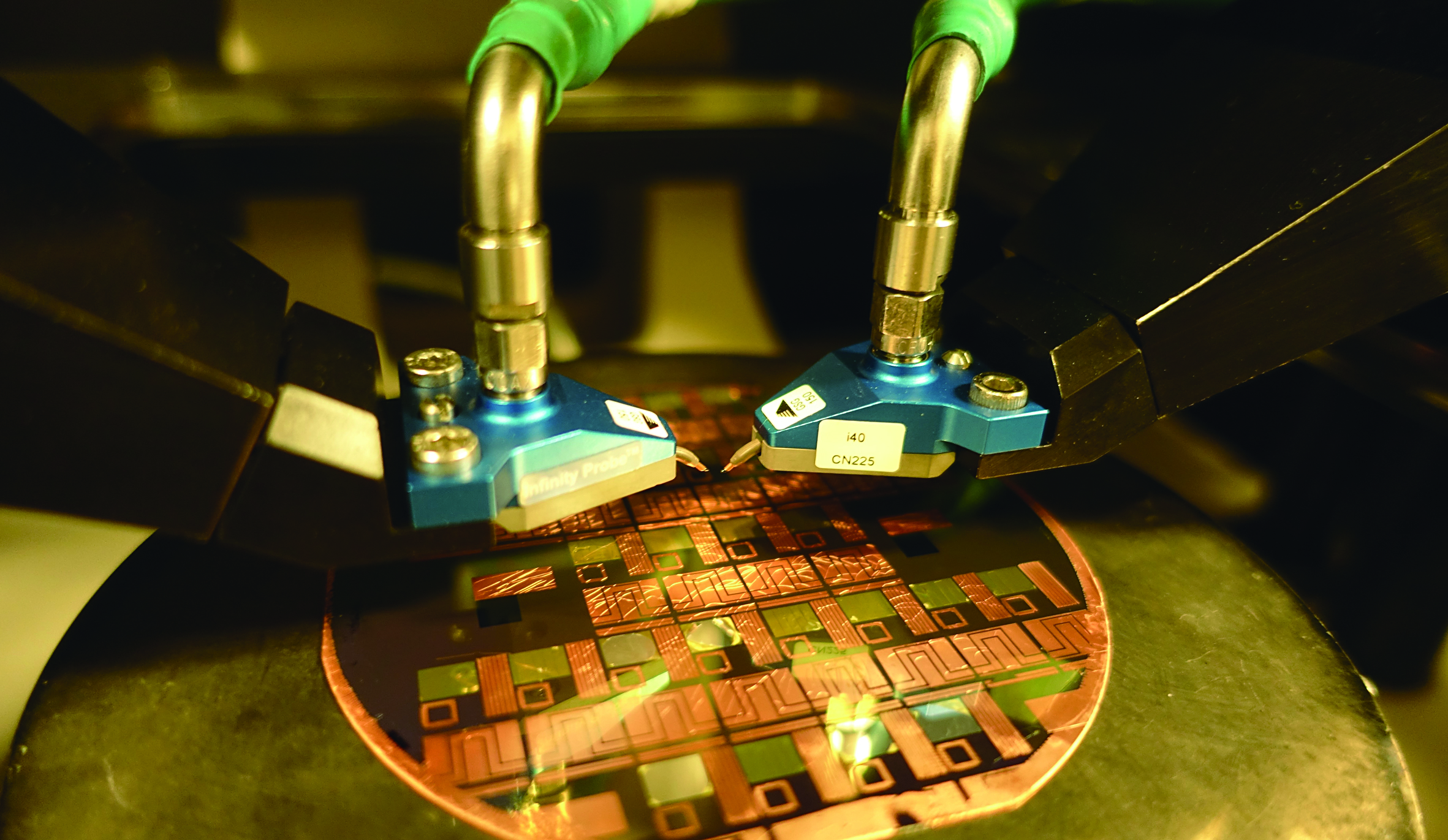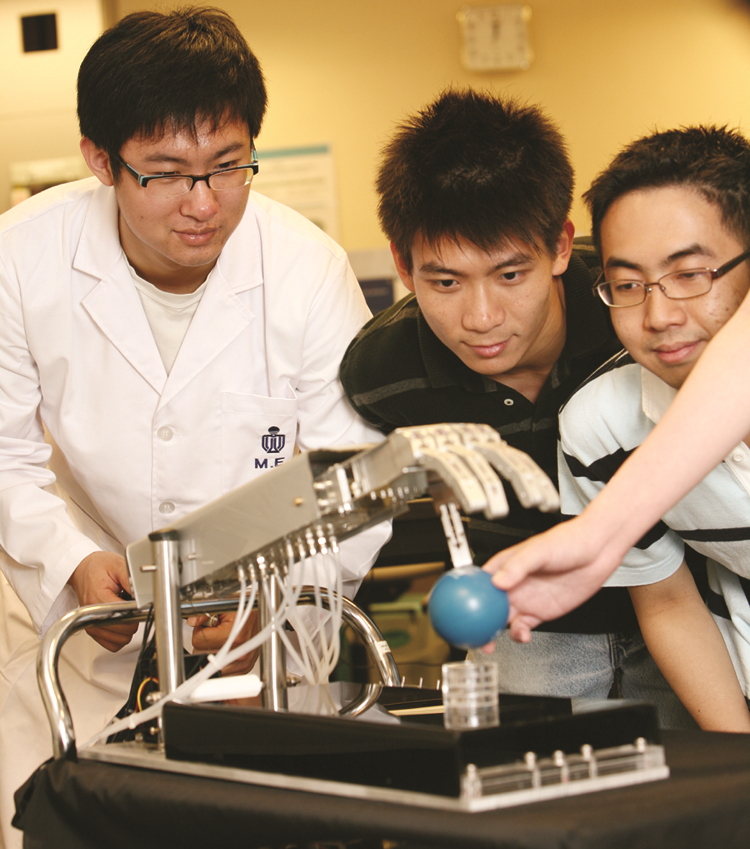Master of Philosophy in Electronic and Computer Engineering
Doctor of Philosophy in Electronic and Computer Engineering
MPhil(ECE)
PhD(ECE)
Both full- and part-time
MPhil
Full-time: 2 years
Part-time: 4 years
PhD
Full-time: 3 years (with a relevant research master’s degree), 4 years (without a relevant research master’s degree)
Part-time: 6 years
PG Programs Coordinator:
Prof Matthew MCKAY, Professor of Electronic and Computer Engineering

The Master of Philosophy (MPhil) Program is designed for those interested in pursuing a career in research and development in industry or academia, and is an excellent preparation for a PhD degree. A candidate for an MPhil degree is expected to demonstrate knowledge in the discipline and to synthesize and create new knowledge, making a contribution to the field.
The Doctor of Philosophy (PhD) Program caters for those wishing to pursue a career in advanced industrial research and development or university research and teaching. It emphasizes training in original thinking and independent research. A candidate for a PhD degree is expected to demonstrate mastery of knowledge in the chosen discipline and to synthesize and create new knowledge, making an original and substantial contribution to the discipline.
On successful completion of the MPhil program, graduates will be able to:
- Demonstrate a solid understanding of scientific theory and methods relevant to ECE;
- Demonstrate sound knowledge of relevant scientific literature;
- Apply theories, methodologies, and knowledge to address important research questions relevant to ECE;
- Demonstrate practical skills in designing or developing ECE systems;
- Demonstrate the ability to independently pursue original research and innovation; and
- Demonstrate oral and written communication skills sufficient for a professional career in ECE disciplines.
On successful completion of the PhD program, graduates will be able to:
- Demonstrate a comprehensive and deep understanding of scientific theory and methods relevant to Electronic and Computer Engineering (ECE);
- Demonstrate mastery of, and critical understanding of, relevant scientific literature;
- Critically apply theories, methodologies, and knowledge to address important fundamental questions relevant to ECE;
- Demonstrate the ability to independently conduct original research and make significant scientific contributions to the ECE discipline; and
- Demonstrate competency in oral and written communication skills at a level sufficient for disseminating the results to the scientific community.

The programs are offered by the Department of Electronic and Computer Engineering with the following research foci and state-of-the-art facilities, enabling students to carry out the pioneering research.
Research Foci
Solid-State Electronics and Photonics
Topics related to Microelectronics, Nanoelectronics, Large Area Electronics, Power and Energy-Efficient Electronic Devices, High-Speed Electronics, Semiconductor Materials, Devices and Fabrication Technology, Micro-Electro-Mechanical Systems (MEMS), Displays, Optoelectronics, Organic Light-Emitting Diodes (OLEDs), Solid-State Lighting, Liquid-Crystal Displays, Liquid-Crystal Photonics, Silicon Photonics, Optical Communications and Interconnects, Solar Cells, Epitaxy of Compound Semiconductors by MOCVD.
Integrated Circuits and Systems
Topics related to Digital, Analog and Mixed-Signal Integrated Circuits (IC) Design, VLSI Design, Embedded Systems, Network-on-Chip and Multiprocessor System-on-Chip, Circuit and System Simulation and Verification Tools. Advanced topics include RF and mm-Wave IC and Systems, Data Converters, Power Management IC, High-Speed Optical Communication Transceiver, Image and Bio-Medical Sensors, Signal Processing and System Architectures, Design Automation, Computer Architecture, Reconfigurable System and Hardware/ Software Codesign.
Wireless Communications and Networking
Topics related to Physical Layer, Signal Processing, Coding and Information Theory, Networking as well as New Architecture for Next Generation 5G Wireless Communications, Massive MIMO and Cloud Radio Access Networks, Interference Management, Heterogeneous Networks, Green Communications, Tactile Wireless Systems For Machine Type (MTC), Device-To-Device (D2D) and Multimedia Communications, Integration of Control and Wireless Communication Theory, Display-Smart Mobile Communications And Interactions, Network Coding Theory and Applications, Cross-Layer Stochastic Optimization, Distributed Algorithms and Optimisations, Big Data Systems, Social Media and Cyber-Physical and Social Computing Systems, Self-Organising Networks, Cloud Computing and Virtualisation.
Biomedical Engineering
Topics related to Medical Imaging, Biomedical Optics and Biophotonics, Neuroengineering, Medical Electronics, Bioinformatics/ Computational Biology and Biomedical Microdevices and BioMEMS.
Control and Robotic Systems
Topics related to Control and Optimization (including System Theory, Optimization Theory, Detection and Estimation, Financial Systems, Networked Sensing and Control), Robotics and Automation (including UAV, Next-Generation Industry Robots, Medical/ Healthcare Robotics, and Autonomous Systems).
Data Science and AI
This area is devoted to the development of theory and algorithms in a variety of domains such as big data analytics, artificial intelligence, speech and language processing, financial analytics, computational biology, bioinformatics, neural engineering, deep learning, signal processing, image processing and computer vision, social and multimedia computing.
Facilities
There are extensive facilities available to support the Department's programs. Laboratories for research and teaching encompass: advanced VLSI design and testing analog, automatic-control, biomedical instrumentation, broadband networks, computer networks and system integration, digital electronics and microprocessors, electro-optics, fine-line lithography, integrated power electronics, machine intelligence, optical device characterization, robot manipulation, signal processing and communication and wireless communication.
Relevant central facilities, research centers and research institutes include: the Automation Technology Center, Center for Networking, Center for Wireless Information Technology, Multimedia Technology Research Center, Nanoelectronics Fabrication Facility, Photonics Technology Center, Semiconductor Product Analysis and Design Enhancement Center.
In addition to the University's central computing facilities, the Department has over 200 Linux/ Solaris workstations and over 900 PCs and Apple computers. Both industrial standard and research-oriented software are used by faculty and students for teaching and research.
- Minimum Credit Requirement
MPhil/PhD: 15 credits
- Required Courses
MPhil:
15 credits of approved coursework, of which at least 9 in the area of Electronic and Computer Engineering.
PhD:
15 credits of approved postgraduate coursework, of which at least 9 in the area of Electronic and Computer Engineering.
The credit(s) earned from ELEC 6900 Independent Study cannot be counted toward the credit requirements.
- School Requirements on PhD Programs
In addition to the program requirements, all full-time and part-time PhD students are required to complete the school requirements, which aim to help students gain a wider exposure to multidisciplinary areas, and attain all-rounded learning by broadening their knowledge base.
PhD students are required to take at least a 3-credit course at 5000-level or above outside their programs offered by the School of Engineering. The 3 credits may be satisfied by courses from other Schools upon approval.
In some exceptional cases where students can provide sufficient justifications and obtain prior approval from their supervisors, PG Coordinators, and Heads of Department/Program Directors or designees, they are allowed to take the 3-credit course within their home departments/programs but the course must be in areas outside their specialty.
Details of the requirements are available on the website of the School of Engineering.
- Graduate Teaching Assistant Training
All full-time RPg students are required to complete PDEV 6800. The course is composed of a 10-hour training offered by the Center for Education Innovation (CEI), and session(s) of instructional delivery to be assigned by the respective departments. Upon satisfactory completion of the training conducted by CEI, MPhil students are required to give at least one 30-minute session of instructional delivery in front of a group of students for one term. PhD students are required to give at least one such session each in two different terms. The instructional delivery will be formally assessed.
-
Professional Development Course Requirement
Students are required to complete PDEV 6770. The 1 credit earned from PDEV 6770 cannot be counted toward the credit requirements.
PhD students who are HKUST MPhil graduates and have completed PDEV 6770 or other professional development courses offered by the University before may be exempted from taking PDEV 6770, subject to prior approval of the School.
Students are required to complete ENGG 6780. The 1 credit earned from ENGG 6780 cannot be counted toward the credit requirements.
PhD students who are HKUST MPhil graduates and have completed ENGG 6780 before may be exempted from taking ENGG 6780, subject to prior approval of the School.
- English Language Requirement
Full-time RPg students are required to take an English Language Proficiency Assessment (ELPA) Speaking Test administered by the Center for Language Education before the start of their first term of study. Students whose ELPA Speaking Test score is below Level 4, or who failed to take the test in their first term of study, are required to take LANG 5000 until they pass the course by attaining at least Level 4 in the ELPA Speaking Test before graduation. The 1 credit earned from LANG 5000 cannot be counted toward the credit requirements.
Full-time students are required to complete LANG 5001. Students can be exempted from taking LANG 5001 with the approval of the Department Head and PG Coordinator. The 1 credit earned from LANG 5001 cannot be counted toward the credit requirements.
- Postgraduate Seminar
Full-time PhD students are required to enroll for ELEC 6950.
- PhD Qualifying Examination
PhD students are required to pass a qualifying examination within two years after admission, with a maximum of two attempts.
- Thesis Research
MPhil:
- Registration in ELEC 6990; and
- Presentation and oral defense of the MPhil thesis.
PhD:
- Registration in ELEC 7990; and
- Presentation and oral defense of the PhD thesis.
Last update: 10 August 2020
- Energy Technology Concentration
In addition to the existing program requirements, students who opt for the Energy Technology concentration are required to:
- Take one ENEG course.
- Complete ENEG 6010 for one term.
- Conduct research in energy area.
- Nanotechnology Concentration
In addition to the existing program requirements, students who opt for the Energy Technology concentration are required to:
- Take one NANO course.
- Complete NANO 6010 for one term.
- Conduct research in nano area.
- Scientific Computation Concentration
In addition to the existing program requirements, students who opt for the Scientific Computation concentration are required to:
- MPhil:
Complete a minimum of 7 credits from the following course lists.
PhD:
Complete a minimum of 10 credits from the following course lists.
The credits earned under the concentration will be counted toward the total credit requirements of the programs.
Core Courses
MPhil: at least 3 credits
PhD: at least 6 credits
All students must take MATH 6915 and MATH 6916. Credits earned from MATH 6915 can be repeated for up to 2 credits.
Elective Courses
- Conduct research in the area of scientific computation.
Last update: 29 August 2023
To qualify for admission, applicants must meet all of the following requirements. Admission is selective and meeting these minimum requirements does not guarantee admission.
-
Applicants seeking admission to a master's degree program should have obtained a bachelor’s degree from a recognized institution, or an approved equivalent qualification;
-
Applicants seeking admission to a doctoral degree program should have obtained a bachelor’s degree with a proven record of outstanding performance from a recognized institution; or presented evidence of satisfactory work at the postgraduate level on a full-time basis for at least one year, or on a part-time basis for at least two years.
Applicants have to fulfill English Language requirements with one of the following proficiency attainments:
-
TOEFL-iBT: 80*
-
TOEFL-pBT: 550
-
TOEFL-Revised paper-delivered test: 60 (total scores for Reading, Listening and Writing sections)
-
IELTS (Academic Module): Overall score: 6.5 and All sub-score: 5.5
* refers to the total score in one single attempt
Applicants are not required to present TOEFL or IELTS score if
-
their first language is English, or
-
they obtained the bachelor's degree (or equivalent) from an institution where the medium of instruction was English.













